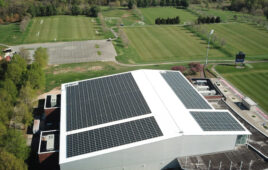Several city organizations are assessing environmentally compromised plots of public land as potential renewable energy project locations in the Hill District of Pittsburgh, Pennsylvania. The Green Building Alliance, the Pittsburgh Department of City Planning, the Energy Innovation Center and Duquesne Light Company secured a grant from the Department of Energy (DOE) for the project.
While establishing a neighborhood-scale clean energy plan, this project will also explore opportunities to retrofit older homes in the Hill District to make them more energy-efficient.
The Hill District’s sloping topography and history present environmental constraints to commercial and residential development of these parcels, which are located over abandoned coal mines, with a coal seam running below. The National Renewable Energy Laboratory will evaluate approximately 600 acres of undermined land as potential locations for solar, thermal or small-scale wind energy generation.
If the land is found to be viable, clean energy generated at these locations would serve Hill District residents, lowering heating and cooling utility and energy costs for those living in the neighborhood.
“This technical assistance comes at a great time for the neighborhood: The Hill District is finalizing its neighborhood plan to shape its next 10 years,” said Flore Marion, sustainability and resilience planner for the City of Pittsburgh. “This assistance will result in a roadmap that create synergies between local new ideas and existing programs and align them with funding sources to create healthier homes and rely on cleaner energy.”
The coalition behind this effort is considering placing any revenue generated by future renewable energy projects in a community fund for initiatives such as land maintenance, tree planting and other amenities.
“In Pittsburgh, 61% of the housing stock is over 100 years old,” said Executive Director Jenna Cramer. “The majority of these homes are energy inefficient, with high maintenance costs due to aging systems and higher year-round energy bills. This creates a disproportionate financial burden to Hill residents, 40% of which are living under the poverty line. By assessing opportunities to retrofit older homes and generating clean, renewable energy on site, we would be able to pass on savings to those living in the Hill District, while also contributing to a healthier community for all. ”
This grant is offered by the Communities Local Energy Action Program (LEAP) through several DOE offices. This pilot program complements DOE’s ongoing efforts to deliver the benefits of clean energy research, development, demonstration, and deployment to environmental justice communities and communities with historical ties to fossil fuel industries.
“The Hill District Clean Energy Strategy strongly aligns with Duquesne Light Company’s mission to create a clean energy future for the customers and communities we serve,” said Elizabeth Cook, general manager of advanced grid solutions at Duquesne Light Company. “We’re grateful for the opportunity to continue supporting our partners in this important effort while championing projects that promote electrification, reduce greenhouse gas emissions and improve energy burden, especially for vulnerable and underserved communities.”
News item from the Green Building Alliance




Tell Us What You Think!